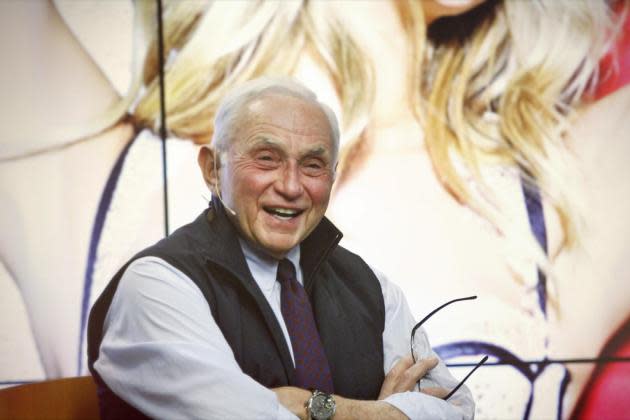‘Victoria’s Secret: Angels and Demons’ Is a Ripping Ride Through Retail — and Jeffrey Epstein — History: TV Review
- Oops!Something went wrong.Please try again later.

Victoria’s Secret is a brand that — like all of the most successful retail companies — sold its customers something they didn’t yet know they wanted. And that audience’s outgrowing the fantasy would have, in and of itself, made for an interesting business story.
But director Matt Tyrnauer — known for superlative documentaries including “Scotty and the Secret History of Hollywood” — had still more to work with in his new series “Victoria’s Secret: Angels and Demons.” The impossible-to-untangle stories of CEO Les Wexner, the retail genius behind a suite of stores in the peak-retail-era shopping mall, and of his seeming shadow, Jeffrey Epstein, make for an increasingly creepy tale of American ambition and overreach, all centered around the female body.
More from Variety
Through interviews and archival footage, Tyrnauer seeks not to solve but to examine this conundrum, depicting the brand’s rise from soft-core catalog to heavily leveraged fashion show and model showcase amid behind-closed-doors scandals involving the corporate suite and the toxic force within. Cleverly, he front-loads the sunny depictions of the company’s early days and Wexner’s work, after his 1982 takeover, in making it a force. The complications are seeded early, set up to explode later.
For a while, things are uplifting! Credit is due, and is given, to Wexner: It is now unimaginable that the lingerie market was once considered outré, given how blithely the brand eventually came to stomp all over the culture. Under Wexner’s leadership, Victoria’s Secret established reliable berths across American malls, amped up a just-short-of-pulpy direct-mail business, and launched a televised “fashion show” intended to frame the “Angel” models as the arbiter of gleeful, cheeky fantasy.
Wexner’s retail genius was, specifically, exclusionary, and tended towards the white and the slight. (So much so that the audience fell away, leading the company’s bombastic statement of purpose, the Victoria’s Secret Fashion Show, to fall off TV airwaves after a final attempt at regaining past viewership in 2018.) Talking heads, including Heidi Zak, the founder of upstart competitor ThirdLove, and former Victoria’s Secret Angel Lyndsey Scott, address the company’s tendency to drill down on an image, and a sense of itself as the final judge of what was and was not “sexy.” That sense relied upon circumscribed rules around race and, especially, body type that our society may just have grown beyond. (A segment about the company’s extending to teen girls with the “Pink” line turned my stomach.) Today, the company is so specifically tied to an image of an unattainably fit woman in wings, strutting a runway, that it might be hard to see its next act clearly.
Perhaps what viewers are likely coming for, though, are the ties between Wexner and the late Epstein, things that have been less in public sight than the Angels’ fall from grace. They will not be disappointed. As text at the end of the first episode informs us, through attorneys, Wexner, who was not made available for an interview for this series, serially denies knowledge of the ways in which Epstein is said to have leveraged his identification with the brand to prey on women; Wexner admits to having been informed on one occasion that Epstein improperly claimed an association with the company. What is alleged throughout, about Epstein using Wexner and the brand to finance his lifestyle in its earliest toxic flourishing, tells a different story, one of an out-of-control egomaniac using corporate wealth to launder his appetites.
This could all too easily feel coincidental: A (now-)world-famous sex pest happens to find himself in the midst of the company redefining what sexy looks like for American women. But Tyrnauer, a filmmaker as well as a journalist who worked for Vanity Fair, has a reporter’s curiosity and an observer’s intuition about the glossy sides of powerful entities, and what lies behind them. And, while he is not immune to the tendency to treat Epstein as a somewhat supernaturally seductive Svengali figure (how else could he have gotten into so many rooms, or gotten Wexner to give him power of attorney?) he carefully situates the man within a universe in which women are being used, for their images or for something else entirely.
What is most dazzling here is not, consistently, new; it is, however, marshalled exceptionally well. Just as the New York Times’ “Framing Britney Spears,” first broadcast on FX and Hulu, might have prompted celebrity-gossip fans to re-evaluate their enjoyment of past Us Weekly covers, this series exists as an intriguing and startling statement about just how many buried assumptions and associations lie beneath the wings that defined shopping for a while. Those eager to learn more about a familiar brand-name will get much out of it; those looking for a nostalgia trip about the glory days of Angel fashion shows will emerge bleary-eyed.
All three episodes of “Victoria’s Secret: Angels and Demons” drop on Hulu on Thursday, July 14.
Best of Variety
Sign up for Variety’s Newsletter. For the latest news, follow us on Facebook, Twitter, and Instagram.

